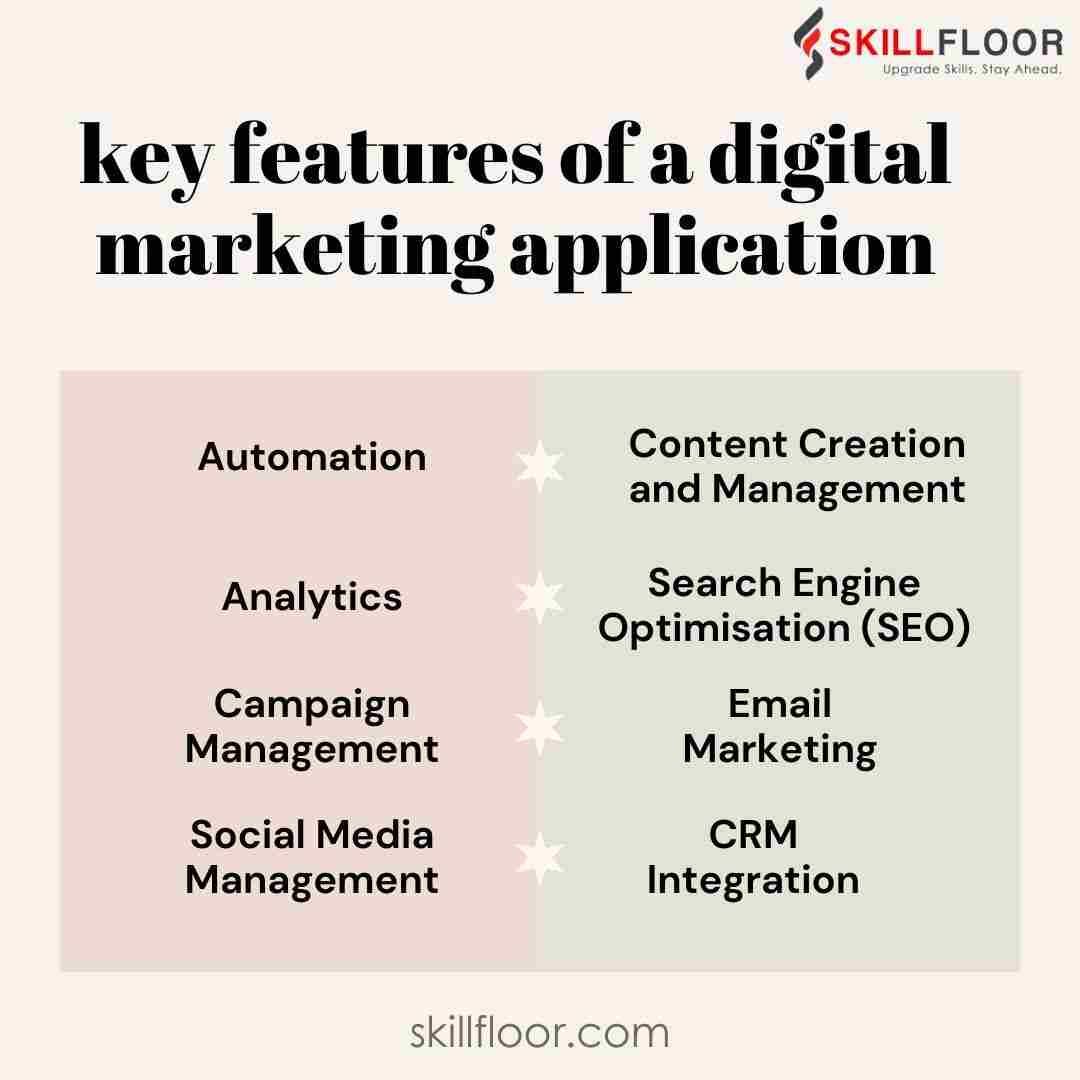Importance of digital marketing applications
Discover why digital marketing applications are crucial for businesses today. Learn about SEO, social media, email campaigns, and more to reach your audience effectively.

The modern quickly changing digital environment has brought about an important shift in the role of digital marketing. The days of depending just on conventional advertising channels are long gone, and companies now need to adjust to the digital era where having an online presence and promoting participation are crucial. It is impossible to overestimate the significance of effective digital marketing, particularly when done with the help of a digital marketing application, given how much more customers are using the internet to find, investigate, and buy goods and services. These programs give companies a whole range of instruments to improve work efficiency, online visibility, participation of audiences, and significant outcomes. A digital marketing application can change the game and open up new avenues for growth and success in the highly competitive digital world by tackling the complicated world of digital marketing.
Consider yourself the owner of a small bakery who has been depending on town fliers and word-of-mouth to draw clients. But as of late, you've seen that foot traffic has decreased and that the nearby bakeries are gaining greater recognition online. You understand that having an online presence is a must for drawing clients in the digital age we live in, but you're not sure where to begin. This situation highlights the necessity of a digital marketing application that can assist you in creating and managing a strong online presence to expand your clientele and grow your company.
Challenges in digital marketing application
Complexity: A lot of features and tools are included in digital marketing services, which can be intimidating to users—especially those who are not familiar with the field. The adoption and efficacy of the application may be slowed down by the time and effort required to learn how to use the interface, set up campaigns, and understand data.
Integration Problems: It can be difficult to integrate digital marketing apps with already-in-use platforms and systems, including as analytics tools, e-commerce platforms, and CRM software. Differences in data and interruption to workflow may result from problems with data timing, compatibility, and API constraints.
Cost: The cost of digital marketing programs varies some may require a large one-time payment or recurrent membership fees. It can be difficult for startups or small firms with little budgets to invest in digital marketing applications, particularly if they don't have the resources to maximize the application's worth or don't know the ROI.
Training and Support: Consistent training and support are necessary for the efficient use of digital marketing applications. It might be difficult for firms to find the time and resources to give users thorough training, though, particularly if the application is complex or updated often. Poor assistance may annoy users and impede the application's uptake and efficiency.
Data Security and Privacy: Sensitive consumer data, including purchase history and personal information, is handled by digital marketing apps. This data needs to be secured to abide with data privacy laws and keep customers' trust. Strong security measures and compliance with laws like the CCPA and GDPR are necessary to ensure data privacy and security within the application as well as during data transit and storage.
Technical Restrictions: Applications for digital marketing may be limited in their functionality or devoid of capabilities necessary for particular marketing campaigns or strategies. For instance, the efficacy and scalability of digital marketing initiatives may be limited by restrictions in automation capabilities, reporting tools, or integration alternatives.
Customization: Off-the-shelf digital marketing applications may not entirely satisfy the specific demands and expectations of businesses. It might be difficult to modify an application to meet particular workflows, branding requirements, or campaign goals, particularly if it is rigid or needs a lot of development work.
Adapting to Changes: New platforms, technology, and consumer behaviors are continually emerging, resulting in a constantly changing field for digital marketing. It can be difficult to keep up with these changes and modify marketing plans appropriately, particularly for companies employing digital marketing tools that don't provide real-time information or broad customization choices.
What are the key features of a digital marketing application?

Automation:
To improve efficiency and reduce repetitive operations and workflows, digital marketing platforms include automation features. This includes starting email campaigns, organizing social media posts, delivering follow-up messages based on user engagements, and instantly updating client information. Automation guarantees efficiency and consistency in marketing efforts while also saving time.
Analytics:
Digital marketing apps with analytics capabilities offer useful information on how well marketing channels and campaigns are performing. Metrics like website traffic, conversion rates, email open rates, social media engagement, and more are available for marketers to monitor. Businesses may optimize their marketing strategy and increase return on investment by using data analysis to make educated choices.
Campaign Management:
Using a single platform, marketers can organize, carry out, and track their campaigns thanks to campaign management tools. This involves deciding on target markets, creating marketing goals, producing content, planning campaign introductions, and monitoring campaign performance indicators. Workflow is simplified uniformity is maintained across channels, and teamwork improves with centralized campaign management.
Social Media Management:
Tools for posting, watching, and evaluating social media interactions and content are frequently included in digital marketing applications. In addition to scheduling posts, marketers may keep an eye on mentions and comments, interact with followers, and review social media performance data. Features for social media management assist companies in creating and sustaining a strong online presence on well-known networks like Facebook, Instagram, LinkedIn, and Twitter.
Content Creation and Management:
Blog posts, articles, videos, infographics, and more can all be created, edited, and published by marketers with the help of content creation and management tools. To create visually appealing and captivating material, these tools could include multimedia editing capabilities, templates, and design elements. Features for content management assist companies in efficiently arranging and distributing material across various media.
Search Engine Optimisation (SEO):
To improve organic visibility and optimize website content for search engines, digital marketing software includes SEO tools and functionalities. Keyword research, link building, meta tag optimization, on-page optimization, and website performance analysis are all included in this. Businesses may increase organic traffic to their websites and raise their search engine ranks by optimizing them for search engines.
Email Marketing:
Businesses may design, send, and monitor email campaigns to specific audiences by utilizing email marketing tools included in digital marketing applications. Email marketers can create attractive email templates, segment email lists according to behavioral and demographic criteria, customize email content, and automate email workflows. One of the best methods for retaining leads, advertising products, and increasing conversions is still email marketing.
CRM Integration:
Digital marketing solutions can better target and personalize their content by syncing customer data through integration with customer relationship management (CRM) systems. Marketers may analyze customer interactions across several touchpoints, obtain insightful consumer data, and send more tailored and relevant marketing messages by integrating with CRM tools. Lead creation, customer engagement, and retention are all improved with CRM integration.
In the current digital age, digital marketing applications are crucial tools for firms. They assist companies in expanding their consumer base, improving productivity, and producing superior outcomes. These programs provide important features like automation, analytics, campaign management, social media management, content generation, SEO, email marketing, and CRM connection, despite potential barriers like complexity and integration problems. Businesses may improve their online presence, efficiently interact with their audience, and eventually expand their business by utilizing these capabilities. To sum up, digital marketing tools are priceless resources for companies hoping to prosper in the fiercely competitive digital market.




























































